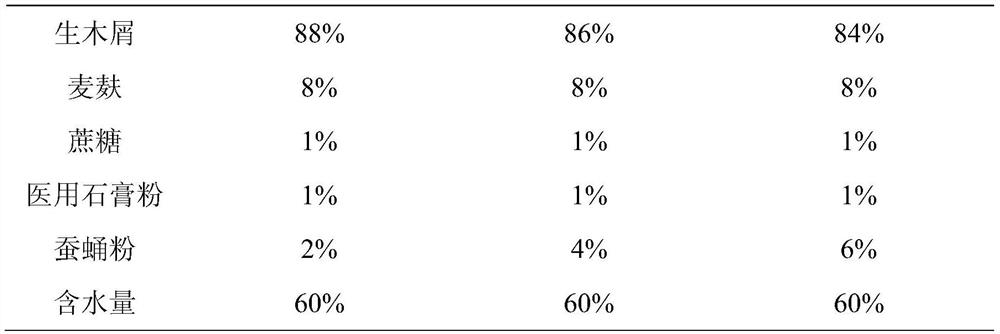A kind of artificial diet of stag beetle larvae
A technology for artificial feed and larvae, applied in the field of insect breeding, can solve the problems of low nutrition, pesticide residues, unfavorable growth of stag beetle larvae, etc.
- Summary
- Abstract
- Description
- Claims
- Application Information
AI Technical Summary
Problems solved by technology
Method used
Image
Examples
Embodiment 1
[0013] Example 1: Nutritional biology research of stag beetle larvae
[0014] 1 Materials and methods
[0015] 1.1 Experimental animals
[0016] From October 2011 to June 2015, 4 times in Shanghai Sheshan, 4 times in Zhejiang Jiuyao Mountain, 3 times in Guangxi Dayaoshan Reserve, 4 times in Chaocheng, Shandong Province, a total of 3 genera of stag beetle larvae were directly excavated from rotten wood with bacteria 6 species: Serrognathustitanus (Boisduval, 1835); Serrognathus consentaneus (Albers, 1886); Prosopocoilus biplagiatus (Westwood, 1855); Prosopocoilus confucius (Hope, 1842) Dorcus hopei (Saunders, 1854); Dorcusantaeus Hope, 1842.
[0017] 1.2 Experimental method
[0018] 1.2.1 Experiment 1 Analysis experiment of stag beetle larva feeding habits
[0019] Collect stag beetle larvae once every quarter (except summer), and collect the larvae to eat the fruiting bodies on the dead wood at the same time; after collection, they are refrigerated and immediately brought ...
Embodiment 2
[0034] Embodiment 2: the research of stag beetle larva artificial diet
[0035] 1 Materials and methods
[0036] 1.1 Experimental animals
[0037] Various stag beetle larvae used in the experiment were artificially bred in July by the Entomological Laboratory of the School of Life and Environmental Sciences, Shanghai Normal University. Among them, the early third instars with similar body weight, yellow head shell color, shiny body surface and strong vitality were selected. stag beetle larvae (L3).
[0038] 1.2 Experimental method
[0039] 1.2.1 Preparation of inoculated section wood feed
PUM
 Login to View More
Login to View More Abstract
Description
Claims
Application Information
 Login to View More
Login to View More - R&D
- Intellectual Property
- Life Sciences
- Materials
- Tech Scout
- Unparalleled Data Quality
- Higher Quality Content
- 60% Fewer Hallucinations
Browse by: Latest US Patents, China's latest patents, Technical Efficacy Thesaurus, Application Domain, Technology Topic, Popular Technical Reports.
© 2025 PatSnap. All rights reserved.Legal|Privacy policy|Modern Slavery Act Transparency Statement|Sitemap|About US| Contact US: help@patsnap.com



